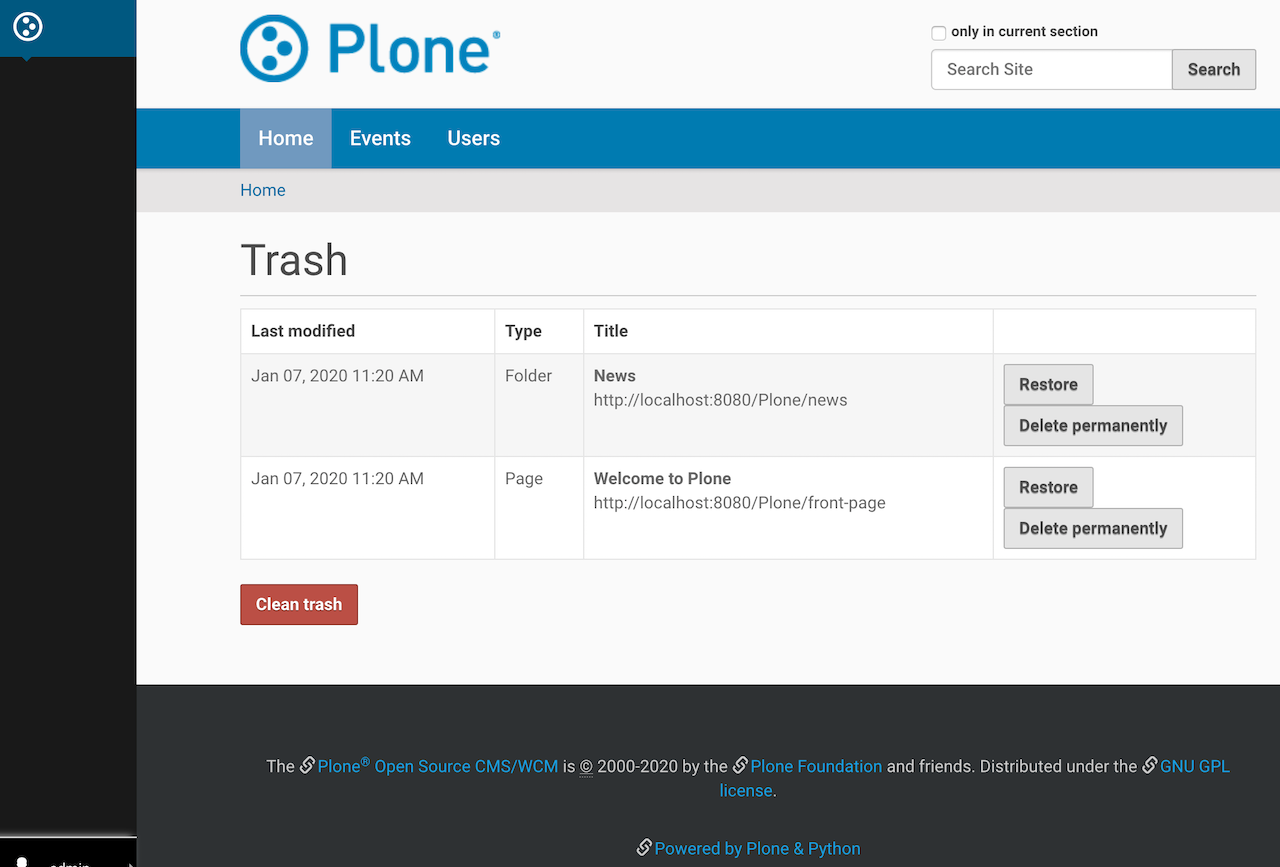A Plone addon introducing a trash with restore functionality.
Project description
ftw.trash is a Plone addon modifying the behavior when deleting content. When a user deletes content, it will actually not be deleted but marked as trashed. Trashed content can then be restored when needed.
Installation and usage
Be aware that ftw.trash requires and installs collective.deletepermission.
Add ftw.trash to the eggs in your buildout configuration:
[instance] eggs += ... ftw.trashInstall the ftw.trash addon in Plone (Addons control panel or portal_setup or quickinstaller).
Deleting content looks exactly as in standard Plone, but it does not actually delete the content but only hide it.
Administrators can restore content with a global trash view, accessible via the user menu.
Personal trashes are not implemented at the moment.

Querying
The catalog is patched, so that it includes the default query {'trashed': False}. This makes sure that we only work with not trashed objects by default.
If you want to access trashed objects, you can simply use the query keyword trashed with one of these values:
False: only return objects which are not trashed.
True: only return objects which are trashed.
None: do not apply “trashed” filter, return trashed and not trashed objects.
These filters only apply when portal_catalog.searchResults is used. When using portal_catalog.unrestrictedSearchResults the behavior is different, especially for trashed=None, since this method is not patched.
Methods for trashing and deleting
ftw.trash patches manage_delObjects so that it trashes the content instead of deleting it. ftw.trash also adds new methods:
parent.manage_trashObjects([id1, id2, ..]): trashes the contents.
parent.manage_immediatelyDeleteObjects(([id1, id2, ..]): immediately deletes the contents without trashing it.
parent.manage_delObjects([id1, id2, ..]): trashes the contents. If called from ZMI (or within link integrity checker), the content is immediately deleted.
The patches are applied on the site root, on DX- and on AT-folders when ftw.trash is installed in the path. For the methods to work properly, the Generic Setup profile must be installed as well.
Manipulate condition for restoring
By default, restoring a page can be compared to adding a new page to its container. Therefore we require the Add portal content permission on the parent. This may depend on the application and the content type though: there are content types which can be seen as part of the content of their parents, in which case we’d like to require the Modify portal content permission for restoring instead. Therefore this behavior can be manipulated by simply registering an adapter for the restored content for which we want to change the behavior.
Example:
Events
These object events are fired:
ftw.trash.interfaces.IBeforeObjectTrashedEvent: the object will be trashed.
ftw.trash.interfaces.IObjectTrashedEvent: the object has been trashed.
ftw.trash.interfaces.IBeforeObjectRestoredEvent: the object will be restored.
ftw.trash.interfaces.IObjectRestoredEvent: the object has been restored.
Internals
When content is deleted, it is marked as ITrashed and IRestorable, children are only marked as ITrashed.
Only the root node of the deleted structure can be restored and thus provides IRestorable. Restoring children without their deleted parents cannot work since the parent is missing.
Trashed content is not moved.
The catalog’s searchResults method is patched so that it filters trashed objects by default.
The contentItems method is patched to exclude trashed content. It is used for listFolderContents and getFolderContents.
Trashed content is prevented from beeing published / accessible through the browser unless the user has the Manager role.
For restoring content, the permissions Restore trashed content and Add portal content are required. The Restore trashed content is granted by default to the roles Manager and Site Administrator on the site root.
Development
Fork this repo
Clone your fork
Shell: ln -s development.cfg buildout.cfg
Shell: python bootstrap.py
Shell: bin/buildout
Run bin/test to test your changes.
Or start an instance by running bin/instance fg.
Links
Copyright
This package is copyright by 4teamwork.
ftw.trash is licensed under GNU General Public License, version 2.
Changelog
1.5.1 (2019-10-18)
Do not check security recursively when trashing in order to have the same behavior as standard Plone. [jone]
1.5.0 (2019-10-02)
Let contentItems, listFolderContents and getFolderContents no longer return trashed content. [jone]
1.4.1 (2019-07-25)
Make it possible to delete single items in the trash view. [jone]
1.3.1 (2019-04-23)
Clean trash, even if there is not enough permission to delete the actual item. [mathias.leimgruber]
1.3.0 (2018-12-17)
Add Plone 5.1 support. [jone]
1.2.1 (2018-11-13)
Patch Products.PloneFormGen to make it aware of trashed objects [Nachtalb]
1.2.0 (2018-08-16)
When restoring a file, redirect to /view so that the file is not downloaded. [jone]
Provide a manage_immediatelyDeleteObjects method. [jone]
Fix cleaning trash when there is a parent and a child in the trash at once. [jone]
Fix and translate error message when trying to restore child of trashed parent. [jone]
1.1.1 (2018-08-03)
Show changelog on pypi. [jone]
1.1.0 (2018-08-03)
Do not restore earlier trashed children when restoring parent. [jone]
Allow deleting content from ZMI. [jone]
Fire events when trashing and restoring object. [jone]
Do not intercept link integrity checker. [jone]
Add “clean trash” functionality to trash view. [jone]
1.0.0 (2018-07-05)
Initial implementation [jone]
Project details
Release history Release notifications | RSS feed
Download files
Download the file for your platform. If you're not sure which to choose, learn more about installing packages.






















